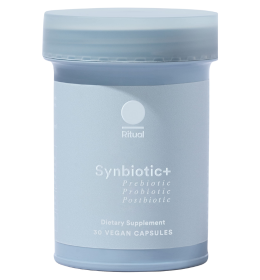
Kombucha is famous thanks to its widely promoted health benefits – and bubbly deliciousness! Thanks to growing evidence that they’re rich in probiotics[1] with vitamins for gut health, fermented foods and drinks like kombucha are getting much more attention.
Kombucha, for example, went from $1 million in sales in 2014 to $1.8 billion in 2019.[2] It’s easy to find nowadays and tasty to drink, but is kombucha good for gut health? Read on to find out what the science says.
Is Kombucha Good For Your Gut?
Yes, Kombucha is good for your gut. Its antioxidant and probiotic-rich properties help balance gut bacteria and reduce inflammation.
When part of a healthy diet, it may also aid mental health, weight loss, immune function, and reduce the risk of certain diseases.
Is Kombucha Beneficial For Gut Health?
Kombucha is often rich in probiotics and antioxidants, making it great for gut health. Probiotics[3] are healthy bacteria that positively influence your gut microbiome. Meanwhile, its antioxidants[4] can combat oxidative stress in the gut.
Let’s explore the science-backed evidence about how kombucha is good for you.
FEATURED PARTNER OFFER

Ritual Synbiotic+
- 3-in-1 formula: prebiotics, probiotics, and probiotics
- Supports a balanced gut microbiome
- Supports bloating, gas, and diarrhea
- Supports the growth of beneficial gut bacteria
- Vegan and Third-party tested
What Is Kombucha?
Kombucha[5] is a fermented drink that combines bacteria, yeast, and sugar with black, red, or green tea. It ferments for at least a week or more and then develops into a colony of bacteria and yeast. Acetic acid, trace levels of alcohol, and gas also form to give it that carbonated fizz.
It has a tangy, slightly sour taste with a bit of sweetness, depending on how much sugar the brand uses. However, the flavor can vary dramatically between brands. So if you’ve tried one or two and didn’t like them – keep trying! The health benefits are well worth it, especially if it helps replace regular soda or simply adds more tea to your life.
Health Benefits Of Drinking Kombucha

Kombucha is rich in antioxidants,[6] especially when made with red or green tea.[7] These antioxidants combat oxidative stress[8] – a primary cause of inflammation.
Chronic inflammation[9] is one of the main underlying factors behind diseases like irritable bowel syndrome, arthritis, heart disease, and certain cancers. When our body’s inflammatory response is heightened for long periods, we can get tissue damage and potential health conditions.
Fortunately, the antioxidants in kombucha have anti-inflammatory properties. Plus, its probiotics can also reduce inflammation.[10] They work to balance out the harmful bacteria in the gut, which can promote a healthy immune response.
May Aid Weight Loss
Just adding kombucha to your diet likely won’t help you lose weight. But, by replacing regular soda with kombucha and adding other healthy habits to your routine, you might notice a difference.
Kombucha made from green tea might be especially helpful since green tea can boost metabolism and fat burning.[11]
The carbonation from kombucha might also help you feel fuller. Furthermore, a healthy gut environment can improve digestion and overall metabolism. There’s also evidence that obesity is linked to an imbalanced gut.[12] Therefore, probiotics may lead to better gut health and weight loss indirectly.
Boosts Mental Health
Emerging evidence on the gut-brain axis[13] shows how connected our gut microbiota is to our mental health. The gut is even referred to as the second brain by many health professionals. Since kombucha is rich in probiotics, it can help the gut-brain axis work better, including:
- Improved neurotransmitter production: The gut produces serotonin,[14] the feel-good neurotransmitter. With a healthier gut, mood regulation might work better.
- Reduced stress hormones: Probiotics might reduce the release of cortisol,[15] the stress hormone.
- Neuroinflammation protection: Chronic inflammation can contribute to mood disorders, but the antioxidants in kombucha might help protect against neuroinflammation.
- Anxiety and depression alleviation: For many reasons mentioned above, probiotics have anti-depressive and anti-anxiety effects that may help reduce symptoms.[16]
May Help Manage Type 2 Diabetes
Type 2 diabetes[17] is characterized by high blood sugar levels due to insulin resistance or a reduced ability to produce insulin. Kombucha, especially if made from green tea, can offer various benefits for diabetes management,[18] such as:
- Improved insulin sensitivity: Green tea has been shown to enhance insulin sensitivity.[19] This can support more efficient glucose uptake by cells for more stable blood sugar levels.
- Antioxidant effects: Since oxidative stress plays a role in the progression of diabetes, kombucha and other fermented foods rich in antioxidants can help counteract this stress.
- Delayed carbohydrate digestion: Some compounds in tea can inhibit the enzymes[20] that break down carbs in the digestive tract and create a slower release of glucose into the bloodstream.
- Balanced gut bacteria: An imbalanced gut microbiome is linked to type 2 diabetes. Kombucha’s probiotics might help promote a healthier gut microbiome[21] that may indirectly support better blood sugar regulation.
If you have diabetes, check the nutrition facts to get one with less than 6 grams of sugar per cup – the lower, the better. Speak to your healthcare professional to see if kombucha can be a part of your daily routine and how to monitor your blood sugar levels.
Strengthens The Immune System
The gut houses about 70-80% of our immune cells![22] The probiotics in kombucha can create a healthier gut and better immune function. Plus, the acetic and glucuronic acid[23] produced during the fermentation process can have antimicrobial effects that fight bacteria, yeast, and pathogens.
May Reduce Cancer Risk
While many factors play a role in cancer development, kombucha’s health benefits might help reduce the risk. Tea polyphenols[24] in kombucha have anti-cancer properties and may inhibit tumor growth.
Its antioxidants also fight DNA mutations and free radicals – the unstable molecules in our body. Plus, a balanced gut microbiome can indirectly influence cancer risk.
How To Drink Kombucha For Gut Health
If you’ve tried kombucha before and weren’t a fan, the first step is to keep trying new brands until you find a flavor you love. From there, follow these steps:
- Choose low-sugar options: There are countless brands and flavors to choose from, so you have plenty of options to find one you enjoy without too much sugar. Check that the sugar content is around 2 to 6 grams per 8-ounce cup or 240 ml serving.
- Start slowly: Adding probiotics quickly can upset your gut flora and cause digestive discomfort, such as bloating and farting. Start with half a cup or 4 ounces daily for a few days and observe the side effects. If you’re okay, slowly increase to one cup a day.
- Consume regularly: If you’ve found a low-sugar kombucha you love, you can drink it daily. About one to two 8-ounce servings daily is enough to reap the benefits.
- Speak to a health professional: If you have specific health conditions, are pregnant or nursing, or take medications, you’ll want to speak to a health professional before adding kombucha to your daily routine.
Conclusion
This trendy fermented tea drink has plenty of emerging scientific evidence showing its benefits for total body health. It can reduce inflammation, aid weight loss, enhance mental health, strengthen the immune system, and potentially help manage type 2 diabetes.
As for how often should you drink kombucha for gut health, choose low-sugar options and drink one to two cups a day. You’ll also want to talk to your healthcare professional before adding it to your day, especially if you have any health conditions.
Frequently Asked Questions
Choose a brand with less than 6 grams of sugar per serving. Aim for one cup or 8 ounces daily, with a max of two 8-ounce servings daily.
Kombucha might help improve your gut health. However, drinking kombucha without changing other unhealthy habits isn’t likely to have a big effect. Try replacing soda with kombucha, water, or green tea to consume less sugar and improve gut health.
Yes, kombucha contains antioxidants and probiotics that can help fight inflammation. However, to reduce gut inflammation, you’ll want a holistic approach. That means more foods that help with bloating instead of a debloat pill, regular exercise, and stress-relieving activities.
It depends – both can be good for gut health. With supplements, however, you can choose the best strains for your needs and get more probiotics. But kombucha also provides other benefits, especially if made with green tea extract.
The effectiveness of kombucha depends on the brand. It’s a good source of probiotics and can be a healthy addition to your daily routine – especially if it’s low in sugar.

